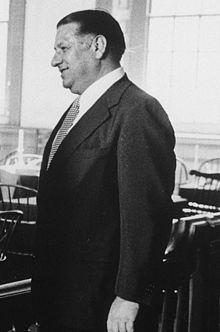Frank Rizzo
| Frank Rizzo | |
|---|---|

Rizzo in 1972
|
|
| 119th Mayor of Philadelphia, Pennsylvania | |
|
In office January 3, 1972 – January 7, 1980 |
|
| Preceded by | James H. J. Tate |
| Succeeded by | William J. Green, III |
| Commissioner of the Philadelphia Police Department |
|
|
In office April 10, 1967 – February 2, 1971 |
|
| Preceded by | Edward Bell |
| Succeeded by | Joseph O'Neil |
| Personal details | |
| Born |
Francis Lazarro Rizzo October 23, 1920 |
| Died | July 16, 1991 (aged 70) |
| Resting place | Holy Sepulchre Cemetery |
| Political party | Democratic (while in office) |
| Other political affiliations |
Republican (1986–1991) |
| Spouse(s) | Carmella Silvestri |
| Children |
Frank L. Rizzo, Jr. Joanna Rizzo Mastronardo |
| Frank Rizzo | |
|---|---|
| Born | October 23, 1920 |
| Died | July 16, 1991 (aged 70) |
| Police career | |
| Department | Philadelphia Police Department |
| Allegiance | United States |
| Years of service | 1943-1971 |
| Rank |
Police Commissioner Appointed 1967 |
| Other work | Mayor of Philadelphia |
Francis Lazarro "Frank" Rizzo, Sr. (October 23, 1920 – July 16, 1991) was an American police officer and politician. He served as Philadelphia police commissioner from 1968 to 1971 and mayor of Philadelphia from 1972 to 1980.
Rizzo joined the Philadelphia Police Department in the 1940s, rising through the ranks to become police commissioner in 1967. He served in that role during the turbulent years of 1967 to 1971, garnering a reputation as a tough, hands-on commissioner.
In many respects, Rizzo was not a typical commissioner. He sometimes quarreled with the city's mayor, James H. J. Tate, whom he called 'sizzle chest'. He was boisterous and brooding, particularly to media. A biography of Rizzo, with an introduction written by future police commissioner John Timoney, recounted: "Of one group of anti-police demonstrators, he is reported to have said, 'When I'm finished with them, I'll make Attila the Hun look like a fag.'" A female reporter who covered the Rizzo years, Andrea Mitchell (now of NBC News), recounted routinely brutish behavior at the force as part of a broad pattern of Rizzo bravado.
Rizzo resigned in 1971 to run for mayor.
Rizzo's relationship with Philadelphia's black community was volatile, with the PPD's reputation suffering among blacks. During Rizzo's tenure as division captain and commissioner, critics often charged that he was racially motivated, targeting activities in black neighborhoods. But his looming presence during the Columbia Avenue riots in 1968 is credited by many for limiting looting and violence.
Rizzo was personally responsible for promoting several black officers during his tenure as commissioner. As deputy police commissioner, he ended practices that had kept black officers from manning patrol cars, after Philadelphia's first black police captain, James Reaves, had accused the department of being racially biased. It was during Rizzo's tenure as deputy commissioner that black and white officers assigned to the city's black neighborhoods worked in tandem in an attempt to reduce friction between civilians and police forces. As commissioner, Rizzo's department had one of the largest percentages of black officers among large U.S. police departments, with 20% in 1968, at a time when other departments had little if any success in recruiting blacks.
...
Wikipedia
